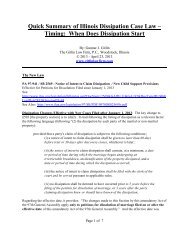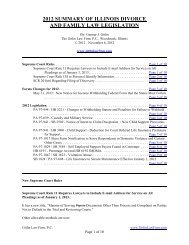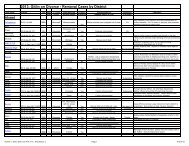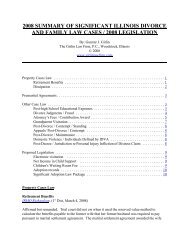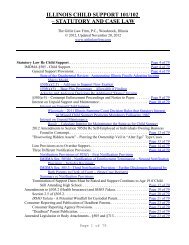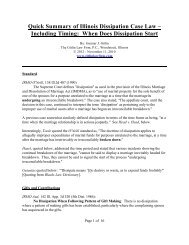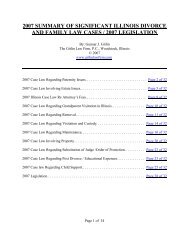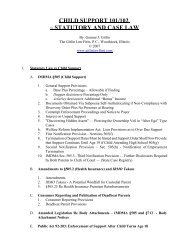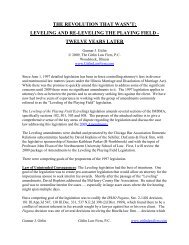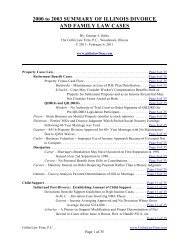Gitlin Law Firm 2008 Illinois Divorce and Paternity Case and ...
Gitlin Law Firm 2008 Illinois Divorce and Paternity Case and ...
Gitlin Law Firm 2008 Illinois Divorce and Paternity Case and ...
Create successful ePaper yourself
Turn your PDF publications into a flip-book with our unique Google optimized e-Paper software.
income. It indicated that the husb<strong>and</strong>’s counsel had informed the employer that they would file a<br />
motion to vacate the trial court’s March 20, 2006 order <strong>and</strong> that the ex-wife’s lawyer indicated<br />
that he did not intend to contest the motion to vacate. It then contended that on April 5, 2006, the<br />
ex-husb<strong>and</strong>’s <strong>Illinois</strong> lawyer notified Knobias that the parties had settled the issue <strong>and</strong> that<br />
Stephen would make payments through ExpertPay. Knobias attached the affidavit of its in house<br />
counsel.<br />
The appellate court summarized the arguments made by Knobias as:<br />
Knobias raises numerous contentions on appeal. Knobias's primary argument seems<br />
to be that, based on the circumstances, it was inequitable to find that Knobias<br />
knowingly failed to withhold the amount designated in the income-withholding<br />
notice. Knobias emphasizes that the notice ordered more money to be withheld<br />
from Stephen's pay than he was making on a monthly basis. Knobias therefore<br />
argues that it was impossible to comply with the trial court's order. Upon receiving<br />
the notice, Knobias maintains, it reasonably relied on Stephen's attorney's<br />
representation that the dispute between Suzanne <strong>and</strong> Stephen had been resolved.<br />
Knobias asserts that, immediately upon notification that the matter had not been<br />
resolved, income was withheld.<br />
The appellate court in rejecting Knobias’ arguments stated:<br />
The notice explained that, if the amount to be withheld exceeded the amount<br />
allowed by the law of its state, Knobias should withhold only the amount allowed<br />
by its state... Despite this sufficient notice, Knobias failed to withhold any of<br />
Stephen's income. Although the record reveals that Knobias realized that the<br />
maximum amount that it could withhold was 50% of Stephen's net income, it did<br />
not withhold that amount until it received notice of Suzanne's petition for a rule to<br />
show cause. Furthermore, although the notice directed Knobias to contact<br />
Suzanne's attorney if it had any questions regarding the notice, it did not. Based on<br />
the clarity of the notice <strong>and</strong> Knobias's failure to adhere to its terms, Knobias cannot<br />
rebut the presumption in the Withholding Act that it knowingly failed to pay over<br />
the amounts that it was obligated to.<br />
Comment: I first stated:<br />
It did not appear at the appellate court level that the issue of choice of law was<br />
addressed. The choice of law should have been the law of the state of Mississippi.<br />
This is because orders or notice of withholding are subject to withholding in each<br />
of the 50 states. However, the penalties of the state of the employer should have<br />
applied. A PLA on this case has been accepted on 9/24/08 (No. 106612).<br />
The update to this is that he the <strong>Illinois</strong> Supreme Court indeed reversed the decision as to the<br />
penalty. The trial <strong>and</strong> appellate court's applied <strong>Illinois</strong> law in Section 35(a) of the IWSA. The<br />
<strong>Illinois</strong> Supreme Court overruled the decision determined that the penalty for failure to comply<br />
with the withholding order had to be based upon Mississippi law. The Gulla court stated:<br />
The <strong>Gitlin</strong> <strong>Law</strong> <strong>Firm</strong>, P.C. Page 26 of 55 www.gitlinlawfirm.com




